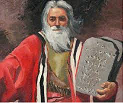Aq – La superioridad del Mesías a Moisés en Su posición 3: 5-6
La superioridad del Mesías a Moisés en Su posición
3: 5-6
La superioridad del Mesías a Moisés en Su posición ESCUDRIÑAR: ¿Quiénes componían la casa de Dios en la Dispensación de la Torá? ¿Qué es la casa de Cristo? ¿En qué se parecen Jesús y Moisés? ¿Qué cualidad tenían Jesús y Moisés en común? ¿De qué manera es el Mesías más grande? ¿Por qué es esto tan importante? ¿Cómo explicaría que alguien que una vez habría profesado fe en Cristo, volvió a caer en el mundo? ¿Cuáles son las dos cosas importantes que aprendemos de Hebreos 3:1-6?
REFLEXIONAR ¿Está sirviendo al Señor con un corazón de amor y afecto, o por un sentido de obligación? ¿Cómo puede auto examinarse y cambiar eso? ¿Cuál es su ministerio en la casa de Dios donde adora? ¿En qué sentido vive ADONAI en usted? Cuando su corazón no se siente como si fuera el templo del Dios viviente, ¿qué dice su cabeza? ¿Qué dice la Escritura? ¿A cuál le cree? ¿Alguna vez se preocupa por su salvación eterna? ¿Está usted en Cristo? ¿Está Él en usted? ¿Qué significa eso?
Hay otro factor en la superioridad de Cristo sobre Moisés: el profeta Moisés habló sobre las cosas por venir, pero Yeshua el Mesías trajo el cumplimiento de estas cosas. Moisés, por así decirlo, ministró “en las sombras” (8:5 y 10:1), mientras que Jesucristo trajo la luz completa y final del evangelio de la gracia de Dios.
 Aceptar a Moisés es aceptar a Jesús: En Números 12:7b dice: mi siervo Moisés, que es fiel en toda mi casa y en Hebreos dice: Jesús es fiel al que lo constituyó, como también lo fue Moisés en la Casa (3:2). Vemos que “Moisés fue fiel en toda la casa de Dios” (Hebreos 3:2 citando Números 12:7). Y Moisés, en verdad fue fiel sobre toda la Casa como siervo, para testimonio de las cosas que se habían de decir (3:5), es decir, en referencia al Mesías. La palabra siervo (en griego therapon) no es la palabra usual que se usa en el Brit Hadashah para siervo o esclavo (griego: doulos). Therapon tiene un carácter ético que se atribuye y habla de un siervo voluntario que actúa por amor y afecto (es un término de dignidad y libertad), y en el Nuevo Pacto, se usa solo para Moisés. Al comienzo de su ministerio, Moisés dudaba y resistió el llamado de YHVH. Pero una vez que se entregó, obedeció con un corazón de amor y afecto.85 Moisés ministró a Israel, el pueblo de Dios en la Dispensación de la Torá (vea el comentario sobre Éxodo Da – La Dispensación de la Torá), y Cristo ministra a Su Iglesia, el pueblo de Dios, bajo la Dispensación de la Gracia (vea Bp – La dispensación de la gracia).
Aceptar a Moisés es aceptar a Jesús: En Números 12:7b dice: mi siervo Moisés, que es fiel en toda mi casa y en Hebreos dice: Jesús es fiel al que lo constituyó, como también lo fue Moisés en la Casa (3:2). Vemos que “Moisés fue fiel en toda la casa de Dios” (Hebreos 3:2 citando Números 12:7). Y Moisés, en verdad fue fiel sobre toda la Casa como siervo, para testimonio de las cosas que se habían de decir (3:5), es decir, en referencia al Mesías. La palabra siervo (en griego therapon) no es la palabra usual que se usa en el Brit Hadashah para siervo o esclavo (griego: doulos). Therapon tiene un carácter ético que se atribuye y habla de un siervo voluntario que actúa por amor y afecto (es un término de dignidad y libertad), y en el Nuevo Pacto, se usa solo para Moisés. Al comienzo de su ministerio, Moisés dudaba y resistió el llamado de YHVH. Pero una vez que se entregó, obedeció con un corazón de amor y afecto.85 Moisés ministró a Israel, el pueblo de Dios en la Dispensación de la Torá (vea el comentario sobre Éxodo Da – La Dispensación de la Torá), y Cristo ministra a Su Iglesia, el pueblo de Dios, bajo la Dispensación de la Gracia (vea Bp – La dispensación de la gracia).
Si esto es lo que son los creyentes, la casa de Dios, entonces deberíamos preguntarnos: “¿Por qué uno construye una casa?” Podríamos concluir: “para vivir en ella”. Qué maravillosa verdad es esta, que ADONAI nos ha redimido para que Él pueda morar entre Su pueblo (Apocalipsis 21:3b). Esto es cierto para los creyentes individualmente. Si ha llegado a YHVH a través de la fe en el Mesías, entonces Él está viviendo en usted, obrando en usted, porque Dios es el que activa en vosotros tanto el querer como el hacer, por su buena voluntad (Filipenses 2:13), por medio del Ruaj HaKodesh. Jesús dijo que el Espíritu estará en los que creen en Él: El Espíritu de la Verdad, al cual el mundo no puede recibir, pues no lo ve ni lo conoce. Vosotros lo conocéis, porque mora con vosotros y estará en vosotros (Juan 14:17).
Pero esto también es cierto para los creyentes corporativamente. Estamos juntos en la casa de Dios. Él habita tanto entre nosotros como en nosotros. El apóstol Pablo (rabino Saulo) dice: Porque nosotros somos santuario del Dios viviente, como dijo Dios: Habitaré entre ellos y entre ellos andaré; Y seré su Dios, y ellos serán mi pueblo (Segunda Corintios 6:16). Usó este punto para argumentar que la Iglesia universal e invisible, compuesta por creyentes judíos y gentiles (Efesios 2:14), está llamada a ser santa, porque ADONAI es santo. El apóstol Pedro (Kefa) también dijo: Vosotros también, como piedras vivas, estáis siendo edificados como casa espiritual para un sacerdocio santo, a fin de ofrecer sacrificios espirituales aceptables a Dios por medio de Jesús el Mesías (Primera Pedro 2:5). La Iglesia es el templo santo donde el Dios santo habita en Espíritu, es adorado y servido.
Cuando construyes una casa, primero colocas la piedra angular, que establece las líneas y los ángulos de toda la casa. Luego viene la base, la que sostendrá la estructura que se construye sobre ella. Pablo nos dice en Efesios 2:19-22 que la Iglesia es tal casa. Yeshua el Mesías mismo es la principal piedra del ángulo, y los apóstoles y los profetas son el fundamento. Su enseñanza, tal como está registrada en la Biblia, nos dice cómo se inició la Comunidad Mesiánica (vea el comentario sobre Hechos Al – El Espíritu Santo vino en Shavuot) y cómo se convirtió en la universal e invisible Iglesia hoy. Dado que los apóstoles son el fundamento (vea el comentario sobre La vida de Cristo Cy – Estos son los nombres de los doce apóstoles), un creyente es aquel que recibe y cree la enseñanza apostólica en el Brit Hadashah y construye su vida sobre él, ya que ese fundamento descansa sobre Cristo mismo.
El TaNaJ revela la geografía de la salvación: si quisieras conocer a HaShem, no podrías buscar en cualquier lugar. Sí, Dios está en todas partes, sin embargo, Él especialmente se reveló a Sí mismo en un lugar determinado, entre Su pueblo en el desierto (vea el comentario de Éxodo Ep – El campamento de las doce tribus de Israel), y especialmente en Jerusalén, en el templo (vea el comentario sobre Primera Reyes As – El Templo de Salomón). Si quería encontrar a ADONAI, tenía que ir allí, donde estaba la casa de Dios, de la misma manera que la reina de Saba fue a Jerusalén en el tiempo de Salomón. Hoy, si quieres aprender acerca de Dios, debes ir a una iglesia (congregación) o a una sinagoga mesiánica donde se enseñe toda la Palabra de Dios. Aunque YHVH está en todas partes, aún se encuentra en Su casa, donde Él sobre todo se revela a Sí mismo a los que vienen en fe.86
Pero Aquél fue considerado digno de tanta más gloria que Moisés, por cuanto mayor honra que la Casa tiene el que la construyó (3:3). Aunque Moisés y Jesús fueron fieles, hubo una diferencia. Yeshua merece más honor que Moisés, así como el constructor de la casa merece más honor que la casa misma (3:3). Mientras Moisés era un siervo fiel en la casa de Dios, el Mesías, como Hijo, era fiel sobre la casa de Dios (3:6a). Moisés no era más que un miembro de la casa espiritual que construyó Jesús. El Mesías creó tanto a Israel como a la Iglesia. Esa es la esencia de Su deidad: Porque cada casa es construida por alguien, pero el que construyó todo es Dios (3:4). Ya que por Él todo fue hecho (Juan 1:3). Él es Dios.
La marca de los verdaderos creyentes: La declaración final muestra la marca de un verdadero creyente: Y nosotros somos esa casa suya, siempre que nos aferremos firmemente al valor y la confianza inspirados por lo que esperamos (3:6b). Esto no significa que los creyentes sean salvos solo si se aferran hasta el fin. No podemos ni salvarnos ni mantenernos salvos. Eso significaría que la salvación se obtiene por obras, no por fe. El punto aquí es que continuar y perseverar en la fe es la evidencia de que una persona es realmente salva. Aquellos que se aferran a su confianza y esperanza están demostrando que verdaderamente han nacido de nuevo. Si alguien profesa a Cristo como Salvador y Señor, pero abandona su profesión por completo, la Biblia dice que, para empezar, nunca fueron salvos: Salieron de nosotros, pero no eran de nosotros, porque si hubieran sido de nosotros, habrían permanecido con nosotros; pero salieron para que se manifestara que no todos son de nosotros (Primera de Juan 2:19).
Aparentemente, había algunos judíos en esta comunidad mesiánica perseguida que se habían apartado, y fue por ellos que el escritor de Hebreos da estas palabras, que advierten y alientan. Algunos estaban al borde del compromiso, pero endurecieron sus corazones y se alejaron (vea As – Hoy, Si escuchan su voz, no endurezcan sus corazones), lo que demuestra que nunca fueron salvos. Los verdaderos creyentes perseveraron, y su perseverancia fue evidencia de su salvación: Decía entonces Jesús a los judíos que le habían creído: Si vosotros permanecéis en mi palabra, sois verdaderamente mis discípulos (Juan 8:31). Una de las verdades más claras del Brit Hadashah es que el Señor se aferra a los que pertenecen a Él (vea el comentario sobre La vida de Cristo Ms – La Seguridad Eterna del Creyente). Yeshua nunca ha perdido a nadie, y nunca perderá a nadie de Su casa.
Examinaos a vosotros mismos si estáis en la fe; probaos a vosotros mismos. ¿O no os reconocéis a vosotros mismos, que Jesús el Mesías está en vosotros? ¡A menos que estéis descalificados! (Segunda Corintios 13:5). Este pasaje nos enseña dos cosas importantes. Primero, debemos estar seguros de que somos verdaderos creyentes. En segundo lugar, cuando sabemos que estamos en Cristo (Efesios 1:3, 7, 11-12), debemos mantener nuestros ojos en Él. Él es todo lo que necesitamos. Estamos completos en Él. 87 Por lo tanto, Yeshua es superior a Moisés en Su posición.
El vagabundeo de Israel por el desierto es un tema importante en el libro de Hebreos. Sin embargo, solo dos hombres en esa nación, Caleb y Josué, ilustran la actitud descrita en Hebreos 3:6b. Todos los demás mayores de veinte años en Israel murieron en el desierto y nunca vieron la Tierra Prometida (Números 14:26-38). Sin embargo, Caleb y Josué creyeron a ADONAI, y Él honró su fe. Durante cuarenta años, Caleb y Josué vieron morir a sus amigos y parientes, pero esos dos hombres de fe tenían confianza en la palabra de Dios de que algún día entrarían en Canaán. Mientras que otros experimentaban dolor y muerte, Caleb y Josué se regocijaron en una confiada esperanza. Como creyentes, sabemos que Dios nos está llevando al cielo, y debemos reflejar el mismo tipo de gozosa confianza y esperanza.88
Señor, Usted me hace posible responder a un llamado celestial que es imposible de abrazar por mi cuenta. A través de tu Espíritu Santo, deme la fuerza hoy para seguirlo al corazón del Padre.89
PÁGINA SIGUIENTE: La superioridad del Mesías en el reposo que da Ar
Volver al esquema del contenido






 Por tanto, hermanos santos, participantes del llamamiento celestial, considerad a Jesús, el Apóstol y Sumo Sacerdote de nuestra fe (3:1 LBLA). La expresión considerad a Jesús podría decirse: siempre pensar en Jesús. Otra versión dice: considerad a Jesús como el Apóstol y Sumo Sacerdote de nuestra profesión (BTX). Estos dos títulos de Jesús no son utilizados en ninguna otra parte del Nuevo Pacto. El escritor imploró a sus lectores considerad a Jesús. La mayoría de ellos ya habían hecho su confesión de que Jesús era su Salvador, el siguiente paso, era hacer a Cristo su Señor y
Por tanto, hermanos santos, participantes del llamamiento celestial, considerad a Jesús, el Apóstol y Sumo Sacerdote de nuestra fe (3:1 LBLA). La expresión considerad a Jesús podría decirse: siempre pensar en Jesús. Otra versión dice: considerad a Jesús como el Apóstol y Sumo Sacerdote de nuestra profesión (BTX). Estos dos títulos de Jesús no son utilizados en ninguna otra parte del Nuevo Pacto. El escritor imploró a sus lectores considerad a Jesús. La mayoría de ellos ya habían hecho su confesión de que Jesús era su Salvador, el siguiente paso, era hacer a Cristo su Señor y 













 Después de haber mostrado que el Mesías es mejor que los ángeles, el primer pilar del judaísmo de su época (1:4 a 2:18), el escritor ahora demuestra que Jesucristo es mejor que Moisés, el segundo pilar del judaísmo de su época (3:1-6). El trasfondo de esta sección es Números 12:5-8. El hermano y la hermana de Moisés desafiaron su autoridad y el SEÑOR intervino, y señaló la fidelidad de Moisés y su singularidad como un profeta con quien Él había hablado cara a cara. Después de Abraham, Moisés fue sin duda el hombre más admirado por el pueblo judío. Volver al sistema levítico significaba volver a Moisés, y los destinatarios de esta carta estaban muy cerca de hacer precisamente eso. Era de vital importancia que el escritor convenciera a sus lectores de que Yeshua el Mesías es mayor que Moisés.74
Después de haber mostrado que el Mesías es mejor que los ángeles, el primer pilar del judaísmo de su época (1:4 a 2:18), el escritor ahora demuestra que Jesucristo es mejor que Moisés, el segundo pilar del judaísmo de su época (3:1-6). El trasfondo de esta sección es Números 12:5-8. El hermano y la hermana de Moisés desafiaron su autoridad y el SEÑOR intervino, y señaló la fidelidad de Moisés y su singularidad como un profeta con quien Él había hablado cara a cara. Después de Abraham, Moisés fue sin duda el hombre más admirado por el pueblo judío. Volver al sistema levítico significaba volver a Moisés, y los destinatarios de esta carta estaban muy cerca de hacer precisamente eso. Era de vital importancia que el escritor convenciera a sus lectores de que Yeshua el Mesías es mayor que Moisés.74 Porque convenía a Aquél por cuya causa son todas las cosas, y por medio del cual todas las cosas subsisten, que habiendo de llevar a muchos hijos a la gloria, perfeccionara por medio de padecimientos al Autor de la salvación de ellos (2:10). La cruz fue una obra maestra de sabiduría. YHVH resolvió el problema que ningún humano o ángel podía resolver. Lo que Él hizo también era consistente con Su santidad, porque Ha’Shem mostró Su odio por el pecado. Fue consistente con Su poder, siendo la mayor demostración de poder jamás vista. El Mesías soportó miles de años de pecado en tan solo unas pocas horas en la cruz: al que no conoció pecado, por nosotros lo hizo pecado, para que nosotros llegáramos a ser justicia de Dios en Él (Segunda Corintios 5:21). Fue coherente con Su amor, en el sentido de que de tal manera amó Dios al mundo, que dio a su Hijo Unigénito, para que todo aquel que en Él cree, no se pierda, mas tenga vida eterna (Juan 3:16), (vea el comentario sobre
Porque convenía a Aquél por cuya causa son todas las cosas, y por medio del cual todas las cosas subsisten, que habiendo de llevar a muchos hijos a la gloria, perfeccionara por medio de padecimientos al Autor de la salvación de ellos (2:10). La cruz fue una obra maestra de sabiduría. YHVH resolvió el problema que ningún humano o ángel podía resolver. Lo que Él hizo también era consistente con Su santidad, porque Ha’Shem mostró Su odio por el pecado. Fue consistente con Su poder, siendo la mayor demostración de poder jamás vista. El Mesías soportó miles de años de pecado en tan solo unas pocas horas en la cruz: al que no conoció pecado, por nosotros lo hizo pecado, para que nosotros llegáramos a ser justicia de Dios en Él (Segunda Corintios 5:21). Fue coherente con Su amor, en el sentido de que de tal manera amó Dios al mundo, que dio a su Hijo Unigénito, para que todo aquel que en Él cree, no se pierda, mas tenga vida eterna (Juan 3:16), (vea el comentario sobre